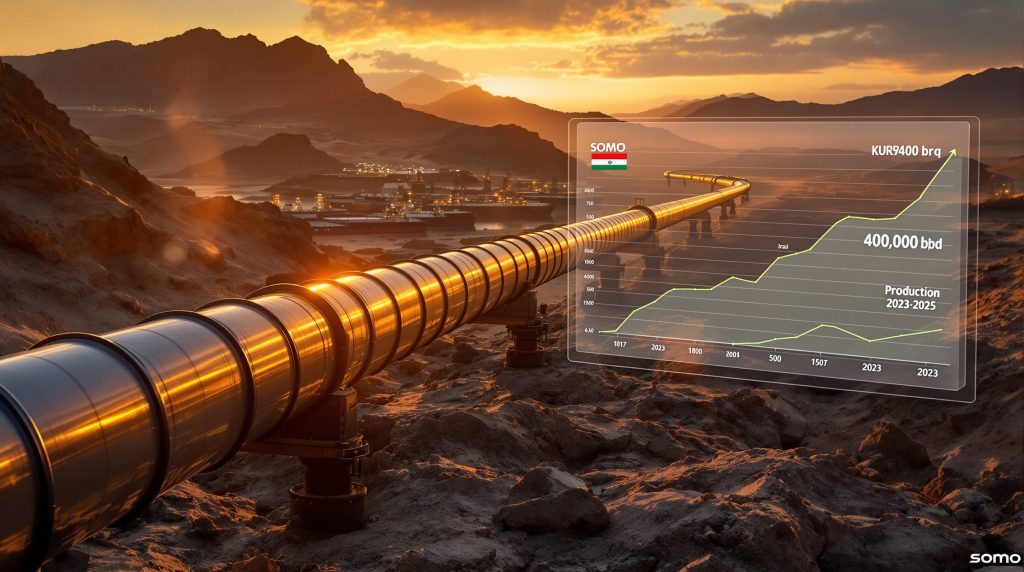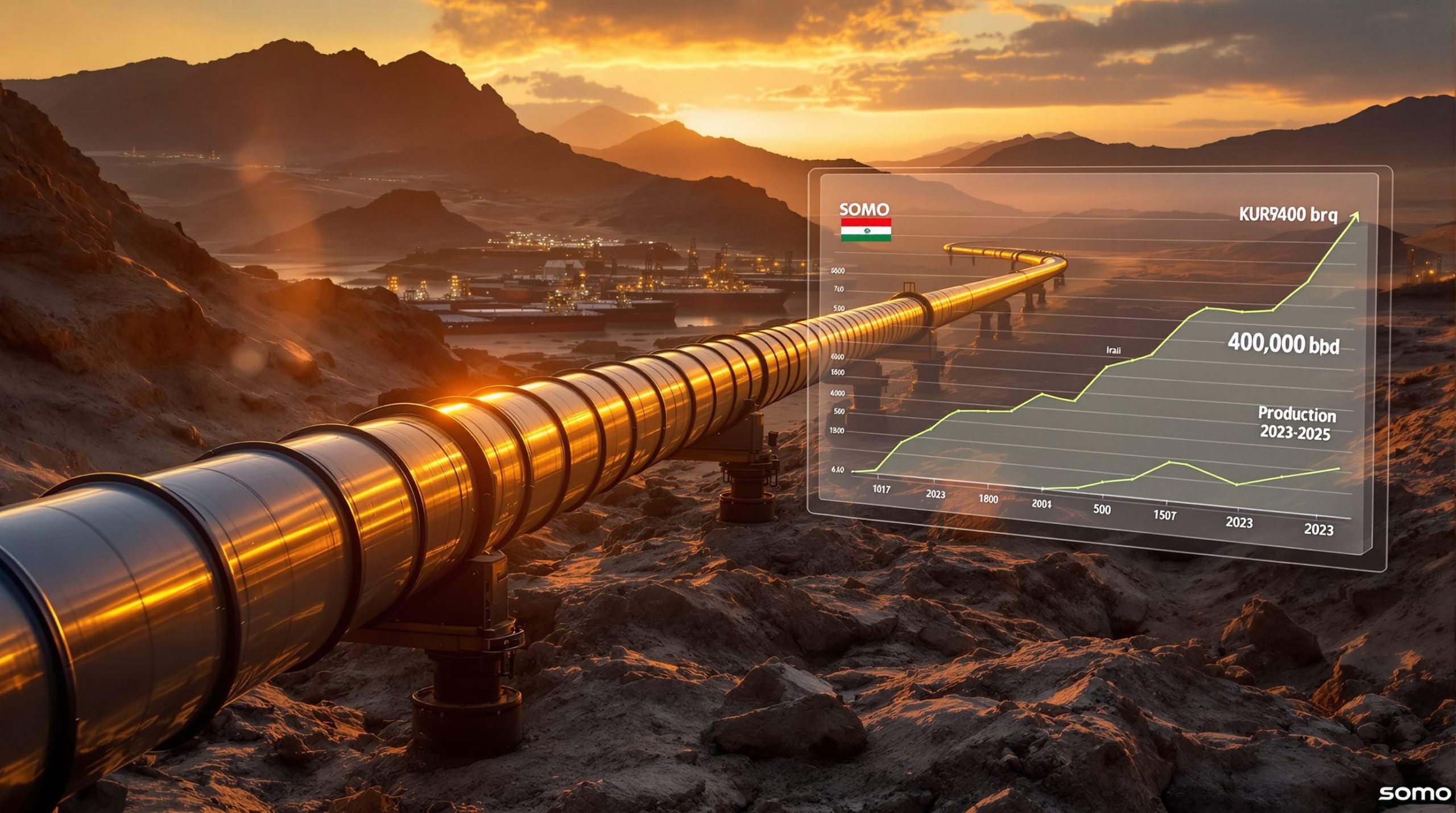Understanding the Kurdistan Oil Export Resumption: A Comprehensive Analysis
The semi-autonomous Kurdistan Region of Iraq is on the verge of resuming its oil exports after a lengthy suspension, marking a significant development in the complex relationship between Erbil and Baghdad. This comprehensive analysis explores the causes of the shutdown, the framework for resumption, and the broader implications for regional politics and global oil price movements.
What Led to the Suspension of Kurdistan's Oil Exports?
The Historical Context of Kurdistan-Iraq Oil Disputes
The Kurdistan Region's independent approach to managing its oil resources has been a persistent source of tension with the federal government in Baghdad for over a decade. At the heart of this dispute lies disagreement over constitutional authority regarding oil exports and revenue distribution, with the central government maintaining that all oil exports must flow through federal channels.
The conflict stems from different interpretations of Iraq's post-2003 constitution, which contains ambiguous language about resource management between federal and regional authorities. Kurdistan has interpreted these provisions as granting significant autonomy over natural resources, while Baghdad views oil as a national asset requiring centralized control.
The 2023 Export Shutdown
In March 2023, Kurdistan's oil exports through the Iraq-Turkey pipeline were abruptly halted, removing approximately 400,000 barrels per day (bpd) from global markets. This disruption wasn't merely a political decision but resulted from an international arbitration ruling that awarded Turkey $1.5 billion in damages for allowing unauthorized exports.
Following this ruling, Turkey ceased allowing Kurdish oil to flow through its territory without Baghdad's explicit approval, effectively shutting down Kurdistan's main export route to international markets. This legal decision reinforced Baghdad's position that it held ultimate authority over Iraq's oil exports.
Economic Impact of the Export Suspension
The prolonged export suspension has inflicted substantial economic damage on multiple stakeholders:
- An estimated $8-10 billion in lost revenue for Iraq and Kurdistan combined
- Severe budget constraints for the Kurdistan Regional Government (KRG)
- Delayed salary payments to public servants and security forces
- Mounting debts to international oil companies operating in the region
- Diminished investment in critical infrastructure and development projects
- A reduction in global oil supply by approximately 0.4% of world production
The economic pain has been particularly acute for Kurdistan's 5 million residents, who have faced delayed salary payments and reduced government services as the KRG's financial situation deteriorated without oil export revenues.
How Will Kurdistan's Oil Exports Resume?
The New Export Framework Agreement
After more than two years of negotiations, Iraq has given preliminary approval for Kurdistan's oil exports to resume under a framework that addresses key points of contention between the parties:
| Agreement Component | Details |
|---|---|
| Export Volume | Initial flow of 230,000 bpd, with potential to increase to previous levels of 400,000+ bpd |
| Marketing Authority | Iraqi state marketing company SOMO will handle all exports and sales |
| KRG Allocation | Kurdistan retains rights to 50,000 bpd for local consumption needs |
| Revenue Distribution | Proceeds will flow through federal mechanisms with KRG receiving its constitutional share |
| Pipeline Operations | Iraq-Turkey pipeline to be operated under renewed agreements between Baghdad and Ankara |
| Restart Timeline | Exports scheduled to resume on September 27, 2025 |
This agreement represents a significant shift in Kurdistan's oil policy, as it relinquishes direct control over marketing its oil while securing a guaranteed allocation for domestic needs and constitutional revenue sharing.
Technical Preparations for Restart
The resumption of exports requires substantial technical preparation after such a lengthy shutdown period:
- Pipeline integrity testing to ensure safety and operational capacity
- Reservoir pressure management at producing fields that have been operating at reduced capacity
- Coordination between multiple international oil companies operating different fields
- Customs and export documentation alignment between Kurdish, Iraqi, and Turkish authorities
- Quality assurance and blending protocols to meet Kirkuk crude specifications for international markets
Engineers face particular challenges restarting fields that have been producing at suboptimal levels during the export suspension, as reservoir pressure and performance characteristics may have changed significantly.
Role of International Oil Companies
Foreign oil companies operating in Kurdistan have played a crucial role in facilitating the export resumption:
- Providing technical expertise for field restart operations after extended periods of reduced production
- Negotiating new payment terms for past and future production
- Committing to continued investment despite political uncertainties
- Accepting modified production sharing contracts that align with federal requirements
- Supporting infrastructure maintenance during the shutdown period
According to a senior executive from one of the international oil firms operating in Kurdistan, "Discussions have intensified and we're closer to a tripartite agreement than we've ever been, as all are showing flexibility." This demonstrates the pragmatic approach being taken by commercial stakeholders to overcome political hurdles.
What Are the Geopolitical Implications of Kurdistan's Oil Export Resumption?
Regional Power Dynamics
The resumption of Kurdistan's oil exports has significant implications for regional power dynamics:
- Strengthens Iraq's position as a unified oil exporter on the global stage
- Reduces Kurdistan's economic independence from Baghdad
- Potentially diminishes Iran's influence in Kurdistan's energy sector
- Creates new opportunities for Turkish-Iraqi economic cooperation
- Impacts Syria's illicit oil trade, which expanded during the official export shutdown
The agreement reinforces Baghdad's sovereignty claims while providing Kurdistan with essential revenue streams, potentially creating a more sustainable balance of power within Iraq's federal structure.
International Diplomatic Efforts
Several international actors have been involved in facilitating the export resumption:
- U.S. diplomatic pressure to resolve the dispute and increase global oil supply
- Turkish willingness to renegotiate pipeline transit agreements
- European energy security interests in diversifying supply sources
- International oil companies' advocacy for a workable solution
- United Nations support for Iraq's territorial integrity while respecting Kurdish autonomy
Western powers have been particularly eager to see Kurdish oil exports resume as part of broader efforts to stabilize global energy markets amid ongoing geopolitical disruptions elsewhere.
Energy Market Implications
The return of Kurdish oil to global markets comes at a significant moment:
- Coincides with OPEC+ production increases
- Helps offset supply disruptions from ongoing conflicts in other oil-producing regions
- Provides an alternative to sanctioned Iranian exports
- Contributes to moderating global oil prices
- Reinforces Iraq's position as a major global supplier
Energy market analysts note that while Kurdistan's contribution of 230,000-400,000 bpd is modest in global terms, it represents a significant marginal addition at a time when supply flexibility is highly valued. This development comes as experts predict a potential US oil production decline by 2025, making Kurdistan's output even more strategically important.
What Challenges Remain for Sustainable Kurdistan Oil Exports?
Ongoing Political Uncertainties
Despite the export resumption agreement, several political challenges remain:
- Constitutional ambiguities regarding resource ownership have not been fully resolved
- Potential for political leadership changes in Baghdad or Erbil could disrupt arrangements
- Lingering disputes over revenue sharing percentages beyond constitutional formulas
- Questions about the status of contracts signed by the KRG with international companies
- Tensions between different Kurdish political factions over resource management
The agreement represents a practical accommodation rather than a permanent resolution of the underlying constitutional questions that have fueled the dispute.
Technical and Infrastructure Constraints
The Kurdistan oil sector faces significant technical challenges:
- Aging pipeline infrastructure requiring substantial investment for long-term reliability
- Limited storage capacity at key transit points
- Field development delays due to the export suspension
- Water management issues in maturing oil fields
- Need for enhanced oil recovery technologies to maintain production levels
These technical limitations could constrain Kurdistan's ability to rapidly return to pre-shutdown export volumes, even with political agreements in place.
Investment Climate Concerns
International investors continue to monitor several risk factors:
- Payment certainty for oil companies under the new arrangement
- Legal protections for existing and future investments
- Transparency in revenue management
- Political stability guarantees
- Competitive fiscal terms compared to other global opportunities
Investment in Kurdistan's oil sector may remain cautious until the export resumption agreement demonstrates stability over time and payment mechanisms function reliably. Furthermore, recent oil price stagnation tied to global trade tensions adds another layer of uncertainty for investors.
How Will Kurdistan's Oil Production Evolve?
Major Producing Fields and Their Potential
Kurdistan's oil production comes from several significant fields with varying production profiles:
| Field Name | Current Capacity | Operator | Future Potential |
|---|---|---|---|
| Tawke | 80,000-100,000 bpd | DNO | Moderate decline without new investment |
| Taq Taq | 25,000-30,000 bpd | Genel Energy | Significant decline from peak production |
| Khurmala | 100,000+ bpd | KAR Group | Stable production with expansion potential |
| Shaikan | 50,000-55,000 bpd | Gulf Keystone | Potential to reach 85,000 bpd with investment |
| Atrush | 30,000-35,000 bpd | Taqa | Moderate growth potential |
These fields have experienced varying degrees of production challenges during the export suspension, with some maintaining output for local refining and others reducing production significantly.
Production Growth Scenarios
The future trajectory of Kurdistan's oil production depends on several factors:
- Speed of export normalization and payment regularization
- Investment in field development following the resumption
- Application of enhanced recovery techniques in mature fields
- Exploration success in new blocks once investor confidence returns
- Political stability and regulatory certainty
Under optimistic scenarios, Kurdistan could not only return to previous production levels but potentially expand beyond 500,000 bpd within several years if investment conditions improve. Recent Saudi Arabia exploration efforts may also influence regional investment patterns and competition for development capital.
Potential for New Discoveries
Despite being a mature producing region, Kurdistan still offers exploration potential:
- Deep reservoir targets below existing fields remain largely untested
- Unexplored blocks in frontier areas of the region
- Application of modern seismic and drilling technologies to better understand complex geology
- Potential for unconventional resources in certain formations
- Gas development opportunities that have been overlooked during the oil-focused period
Geological studies suggest that Kurdistan may have only produced a small fraction of its total hydrocarbon potential, though realizing this potential requires significant capital investment.
What Does This Mean for Global Oil Markets?
Supply Impact Assessment
The resumption of Kurdistan's oil exports will have measurable effects on global supply:
- Adds approximately 0.2-0.4% to global oil supply when fully implemented
- Helps offset production declines in mature basins elsewhere
- Provides medium-gravity, moderate-sulfur crude desired by many Mediterranean refiners
- Reduces pressure on strategic reserves in a tight market
- Contributes to market stability by increasing supply diversity
While Kurdistan's contribution is modest in percentage terms, it represents a significant marginal addition in a market where small supply changes can have disproportionate price impacts.
Price Implications
Market analysts anticipate several price effects:
- Modest downward pressure on Brent crude benchmarks in the $1-2 per barrel range
- Narrowing of certain regional price differentials, particularly in the Mediterranean market
- Reduced risk premium related to Middle East supply disruptions
- Enhanced competitive pressure on similar crude grades from North Africa
- Potential for increased refining margins for certain configurations optimized for Kurdish crude
The price impact may be muted by the gradual nature of the export resumption and ongoing production discipline from major producers elsewhere.
Buyer Realignment
The return of Kurdish oil will trigger some realignment among crude buyers:
- Mediterranean refiners regaining access to pipeline-delivered crude after seeking alternatives
- Asian buyers evaluating Kurdish crude versus alternative sources as SOMO markets the barrels
- European refiners seeking to diversify away from Russian supplies may find Kurdistan an attractive option
- U.S. refiners potentially increasing imports of compatible grades to replace declining heavy oil supplies
- Independent traders developing new blending opportunities with Kurdish crude characteristics
The marketing authority granted to SOMO may alter traditional buying patterns established during Kurdistan's period of independent oil sales.
How Will This Affect Iraq's Overall Oil Strategy?
Integration with National Production Goals
Kurdistan's production will now be more closely integrated with Iraq's broader oil strategy:
- Contribution to Iraq's OPEC production quotas and compliance calculations
- Alignment with national infrastructure development plans for the energy sector
- Coordination with federal field development priorities to optimize national output
- Harmonization of export quality specifications across all Iraqi crude streams
- Joint marketing strategies for international buyers seeking reliable supply relationships
This integration could strengthen Iraq's position within OPEC and enhance its ability to implement cohesive national energy policies.
Revenue Management Reforms
The export resumption agreement includes important fiscal reforms:
- Transparent revenue collection mechanisms through federal banking channels
- Clearer distribution formulas between federal and regional governments
- Improved audit and oversight procedures to build mutual trust
- More predictable payment schedules for international oil companies
- Dedicated infrastructure investment allocations to maintain export capacity
These reforms address longstanding concerns about transparency and accountability in Iraq's oil sector that have complicated relations between Baghdad and Erbil.
Long-term Strategic Planning
The resolution of the Kurdistan export dispute enables more coherent long-term planning:
- Coordinated field development across all Iraqi producing regions
- Strategic pipeline and export facility investments with reduced political risk
- Integrated approach to attracting international investment
- Unified representation in international forums on energy policy
- Consistent regulatory framework development benefiting all regions
This coordination could significantly enhance Iraq's ability to develop its energy resources in alignment with global market trends and technological developments. In contrast, policy shifts like recent Alaska drilling policy changes in the United States show how political decisions can significantly impact regional energy development strategies.
What Lessons Can Be Learned from the Kurdistan Oil Dispute?
Resource Federalism Challenges
The Kurdistan-Iraq oil dispute highlights common challenges in resource federalism:
- Balancing regional autonomy with national cohesion in resource-rich states
- Designing equitable revenue sharing mechanisms that accommodate different regional needs
- Establishing clear constitutional authorities that withstand political changes
- Managing international commercial relationships across multiple governance levels
- Developing technical capacity at both federal and regional levels
These challenges have relevance beyond Iraq to other countries with federal systems managing significant natural resources.
Conflict Resolution Mechanisms
The eventual resolution provides insights into effective dispute resolution:
- Importance of third-party mediation to overcome bilateral deadlocks
- Value of technical working groups alongside political negotiations
- Benefits of phased implementation approaches that build confidence gradually
- Need for flexibility in interpreting legal frameworks to achieve practical outcomes
- Recognition of commercial realities alongside political principles
The pragmatic approach ultimately adopted suggests that economic imperatives can sometimes overcome even deeply entrenched political positions.
International Investment Protection
The experience offers lessons for international investors in politically complex regions:
- Importance of understanding constitutional frameworks and political risks
- Value of maintaining relationships with all stakeholders across political divides
- Need for robust force majeure provisions in contracts operating in disputed territories
- Benefits of diversified asset portfolios to manage regional concentration risks
- Importance of community support and social license beyond formal contracts
Companies that maintained engagement with both Baghdad and Erbil throughout the dispute have generally emerged in stronger positions as exports resume.
What Are the Economic Implications for Kurdistan?
Budget Stabilization Effects
The export resumption will have significant fiscal impacts for the KRG:
- Restoration of predictable revenue streams after years of severe budget constraints
- Ability to address accumulated salary arrears for public sector employees
- Reduced dependence on Baghdad for budget transfers and short-term loans
- Improved capacity to service existing debts to international creditors
- Potential for new infrastructure investments in critical public services
The economic stability provided by oil revenues is essential for Kurdistan's governance capacity and public service delivery.
Private Sector Development
Beyond direct oil revenues, the export resumption will affect Kurdistan's broader economy:
- Revitalization of oil services sector employing thousands of local workers
- Increased economic activity in transportation and logistics linked to the oil sector
- Improved banking and financial services environment as cash flow stabilizes
- Growth in construction and real estate sectors as confidence returns
- Enhanced investor confidence across multiple industries beyond energy
These secondary economic impacts may ultimately generate more sustainable employment than the oil sector itself.
Long-term Economic Diversification
The oil export resumption provides an opportunity to address economic diversification:
- Investment in non-oil sectors using stable oil revenues as a foundation
- Development of downstream petrochemical industries to capture more value locally
- Growth of agriculture and food processing capabilities to reduce import dependence
- Expansion of tourism and hospitality infrastructure as regional stability improves
- Investment in education and workforce development for knowledge-based sectors
Kurdistan's leadership has repeatedly emphasized diversification goals, but implementation has been hampered by the fiscal constraints of the export suspension period.
FAQs About Kurdistan's Oil Export Resumption
When exactly will Kurdistan's oil exports resume?
The official restart date has been announced as September 27, 2025, though initial flows may be gradual as systems are brought back online and production is ramped up from fields that have been operating at reduced capacity.
How much oil will Kurdistan initially export?
The preliminary agreement specifies an initial export volume of approximately 230,000 barrels per day, with the Kurdistan Regional Government retaining rights to 50,000 barrels per day for local consumption.
Who will be responsible for selling Kurdistan's oil?
Under the new agreement, Iraq's State Organization for Marketing of Oil (SOMO) will have exclusive authority to market and sell all oil exports from Kurdistan, ending the KRG's previous independent marketing arrangements.
How will revenue be distributed?
Oil export revenues will flow through federal mechanisms, with the KRG receiving its constitutional share according to population-based formulas and specific provisions in Iraq's federal budget law.
What happens to the contracts signed by international oil companies?
The agreement includes provisions that recognize the production sharing contracts signed by the KRG with international oil companies, though with modifications to align them with federal requirements and ensure SOMO's marketing authority.
Further Exploration:
Readers interested in learning more about the geopolitics of Middle Eastern oil exports can also explore related educational content from OilPrice.com, which regularly publishes analysis on regional energy developments and global oil markets. Additionally, for up-to-date reporting on the Kurdistan oil situation, Reuters' energy coverage provides comprehensive insights into the most recent developments.
Ready to Capitalise on the Next Big ASX Mineral Discovery?
Stay ahead of the market with real-time alerts on significant ASX mineral discoveries powered by Discovery Alert's proprietary Discovery IQ model. Visit our discoveries page to understand how major mineral discoveries can generate substantial returns and begin your 30-day free trial today.




